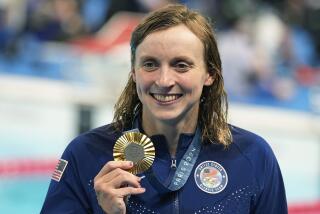Her Reaction Is Priceless
- Share via
You might remember Misty Hyman. And if not, chances are you’d remember her face.
That is, the expression on her face after she won the gold medal in the 200-meter butterfly in the Sydney Olympics. Hyman upset Australia’s Susie O’Neill, who hadn’t lost the event in six years, setting an Olympic and American record of 2 minutes 5.88 seconds.
When the race was over, Hyman thought all the cheering was for O’Neill. A look of disbelief settled in once she saw her time and her place on the scoreboard. When she got out of the pool, her teammates rushed to congratulate the new champion, enveloping her in a massive hug.
“I know how much it meant to me,” she said. “I was so in the moment. It was one of those pure, spontaneous, real moments. [When I watch the tape] I laugh at myself and everybody laughs at me. I’m like, ‘That’s how I was feeling.’ You can’t say it any better than that.”
It was a race, and a reaction, that USA women’s swimming Coach Mark Schubert said he ranks in the top five swimming moments of all time.
Four years and one shoulder surgery later, Hyman has gained perspective. She has become less dependent on Misty the swimmer and more comfortable with Misty the person.
Hyman’s defense of her gold medal begins this week at the U.S. Olympic swimming trials in downtown Long Beach. But her growth process started when she injured her left shoulder training for the 2001 Goodwill Games. The injury required surgery. Suddenly, a life built upon what she did in the pool took an unexpected turn.
Shortly after her surgery, Hyman and 40 other Stanford students left to spend three months in Santiago, Chile, where she lived with a swimming family and trained with a club team.
But recovery meant that anything resembling training was slow and infrequent. That left Hyman with time to be a part of the community and get to know her host family. Although she had studied Spanish before the trip, her time in the Spanish-speaking house left her fluent in the language.
“I’ve traveled all over the world because of swimming, but most of the time it’s from the hotel to the pool,” she said. “It was the first time I’ve been immersed in another culture and got to really experience it.”
Being out of the pool also forced Hyman, who hadn’t taken more than two weeks off from training since she was 5 years old, to do some self-evaluation.
“I almost didn’t know what to do with myself, in a way,” she said. “But I also got to find out that I liked myself whether I was a gold medalist or not.”
The road to that discovery, she said, was a long one. She took a year off after surgery, and when she came back in 2002, she “basically had to start from scratch.” Despite the devastation the injury brought, Hyman said, she is better for it.
Since recovering from the surgery, training has been a balancing act for Hyman, who has been plagued by sinus infections throughout her career. Pushing too hard in practice often left her sick or nursing a sore shoulder.
But in the last few months, Hyman said things have begun to fall into place. Workouts have gone smoothly, and she has replaced her antibiotics regimen with homeopathic remedies that, she said, seem to be working.
“It had been an uphill battle,” she said. “Just in the last three months, I’ve really started to get my confidence back. I finally feel like I’m in the position where I’ve got a shot. That’s really gratifying for me, considering all I’ve been through. I’m not a shoo-in by any means.”
Today, Hyman divides her time between swimming and motivational speaking, a career she began in 2000.
“It comes natural to me,” she said. “I enjoy sharing and being able to inspire people. I really feel blessed to be where I am, and if it makes a difference to other people that makes me feel good too. You can’t get a better job than that.”
Hyman is happy with the woman she has become in the four trying years since she won gold in Sydney.
Although she isn’t sure how much longer she will swim, she said Beijing in 2008 is a possibility.
“I feel really lucky to be professional and make a living swimming,” she said. “I never dreamed that I’d have that kind of time to live this lifestyle.”
More to Read
Go beyond the scoreboard
Get the latest on L.A.'s teams in the daily Sports Report newsletter.
You may occasionally receive promotional content from the Los Angeles Times.






